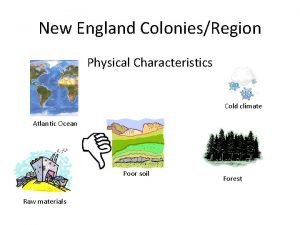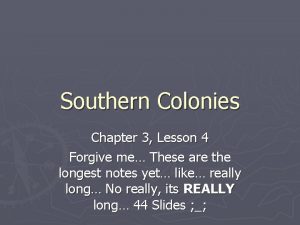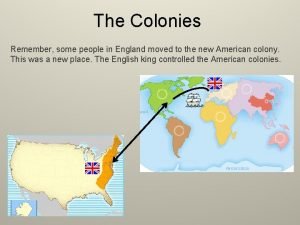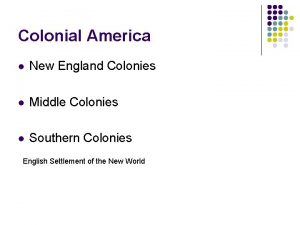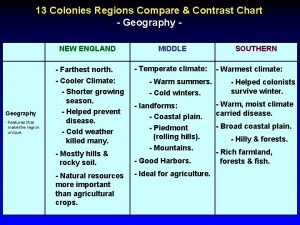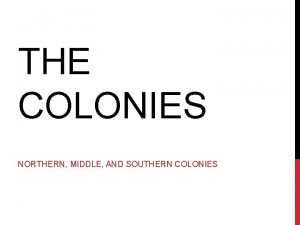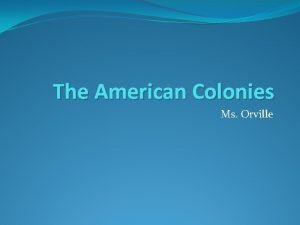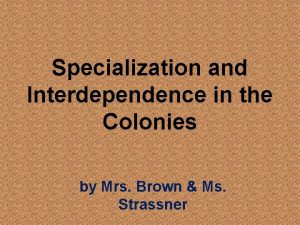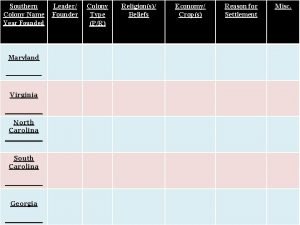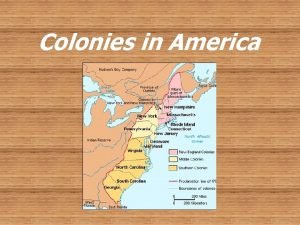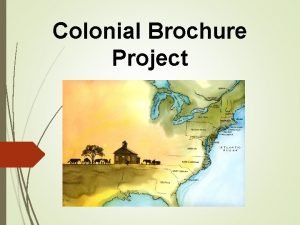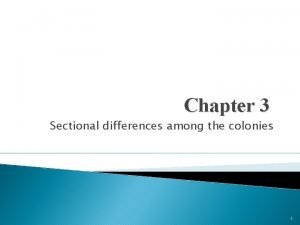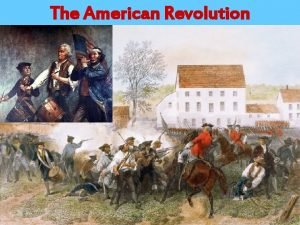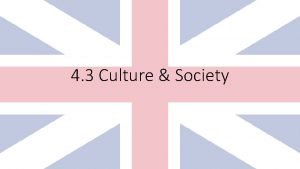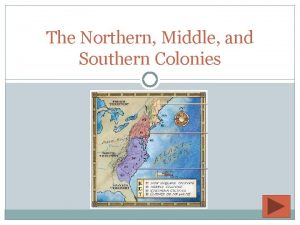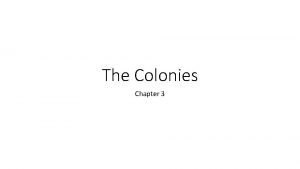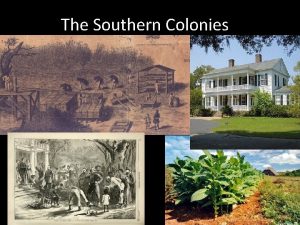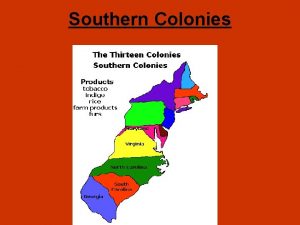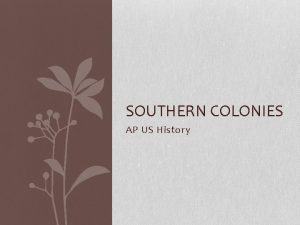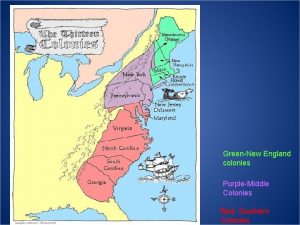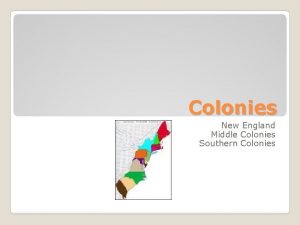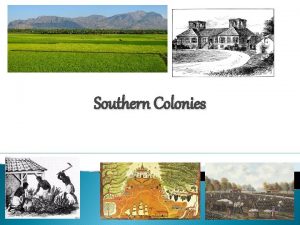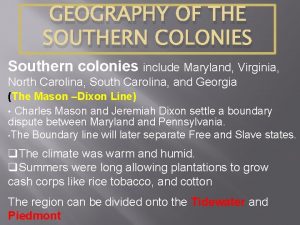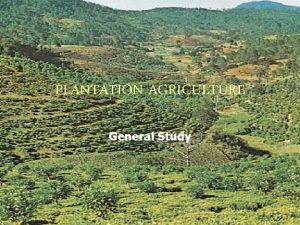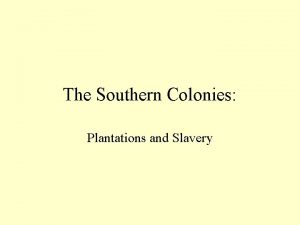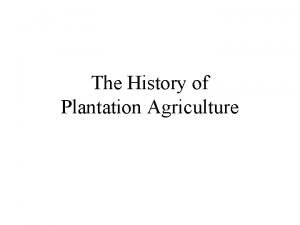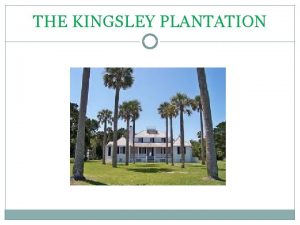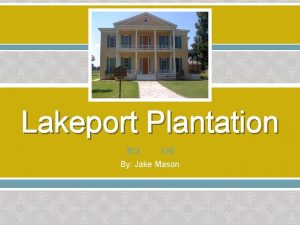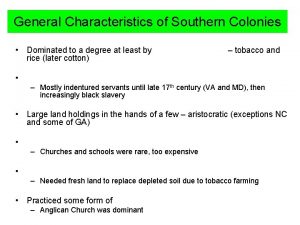Chapter 2 APUSHHonors Southern Colonies General Characteristics Plantation




















- Slides: 20

Chapter 2 APUSH/Honors

Southern Colonies • General Characteristics • • • Plantation economy: tobacco and rice Slavery in all colonies Large land holdings Sparsely populated Religious toleration • Chesapeake (Virginia and Maryland) • Virginia • John Rolfe • House of Burgesses • Maryland • Catholic haven/profit • Act of Toleration

Southern Colonies • Life in the Chesapeake • Tobacco Plantation Economy • Headright System • Indentured Servants • Bacon’s Rebellion (1676) • The Carolinas • British West Indies • Carolina • Rice, Indigo • Charlestown • North Carolina • Georgia • James Oglethorp • Debtors haven

Southern Colonies • Colonial Slavery • • Middle Passage Slave Codes Slave Life Slave Culture • Oral Traditions, Religion, Music • Slave Rebellions • Stono Rebellion (1739) • Southern Society— 18 th century • Class Structure • Underdeveloped • Why different from England?

Southern Colonies • Essay Questions: • Compare and contrast the Chesapeake and Carolina regions. Were there actually “two souths”? • What role did geography play in the development of the Southern colonies in the 17 th century economically, socially, and politically? • Trace the development of indentured servitude and black slavery in the seventeenth and eighteenth centuries. • Analyze the relations between the governments and settlers of the southern colonies and Native Americans.

New England (17 th Century) • Plymouth Colony • Pilgrims/Separatists • Mayflower • Plymouth Bay • Mayflower Compact • Relations with Amerindians • Success of Pilgrims • Massachusetts Bay Colony • “Great Migration” • John Winthrop • Massachusetts • Religion and Politics • Government • Church Leadership

New England (17 th Century) • Massachusetts Bay Colony • Religious dissenters • Quakers • Anne Hutchinson (antinomianism) • Roger Williams • “Liberty of conscience” • Decline of Puritanism • “Half-Way Covenant” • Salem Witch Trials • Cotton Mather • Rhode Island • Connecticut • Fundamental Orders

*Always save your work, Mr. Lee made that mistake at this point*

New England (17 th Century) • Relations with American Indians • Pequot War (1636 -1637) • New England Confederation • King Philip’s War (1675) • Dominion of New England • Charles II • Mercantilism • Navigation laws • Sir Edmund Andros • “Glorious Revolution” • N. E. Economy • Geography/demography • Less diversity • Work ethic

New England (17 th Century) • New England Society • American Character • Democracy • Perfectionism • Work Ethic • Education • Harvard • Small villages and farms • N. E. Family

N. E. Review What political and religious circumstances in England led to the formation and development of New England? • Persecution of Puritans in England resulted in the migration of Pilgrims and Puritans in the 1620 s • English Civil War significantly reduced migration to New England • English Civil War preoccupied English gov’t and left the colonies to fend for themselves

N. E. Review How did religion play a role in the development of the New England colonies? Pilgrims came for religious freedom in 1620 Puritans came starting in 1629 to “build a city on a hill” Rhode Island founded by a religious dissenter, Roger Williams Connecticut River colonies founded by Puritan communities Puritan clergy had much power until the late 17 th century Education important so that people could read the Bible; high literacy rate • Creation of tightly-knit communities • • •

N. E. Review How did New England differ socially, economically, and politically from the southern colonies? • Socially: emphasis on Puritanism (little religious toleration), education, strong family and community ties • Economically: diverse economy—trade, fishing, shipbuilding, shipping, fur trade, some dairy farming, some corn and wheat farming; low slave numbers • Politically: church members could vote, not as aristocratic, strong communities

N. E. Review How did Puritanism in N. E. lead towards democracy? • Townhall meetings • Church members could vote

Essay Questions • Analyze the role of religion in the development of the N. E. colonies. • Compare and contrast the N. E. colonies and the Southern colonies politically, economically, and socially. • What was the role of geography in the development of N. E. colonies? • Analyze the relationship between the N. E. colonies and Amerindians.

Middle Colonies (Mid-Atlantic) • Characteristics • • Excellent land for farming: “bread colonies” Three rivers Less aristocratic Fewer industries than N. E. , more than South • Shipbuilding, lumbering • Shipping and commerce • Most ethnically mixed population • New York • New Netherlands • New Amsterdam • Patroonship • Challenge to New Netherlands

Middle Colonies (Mid-Atlantic) • New York Chapter of Liberties (1683) • NY royal colony • Autocratic in Character • Leisler’s Rebellion (1691) • Pennsylvania • Quakers • William Penn • Success • • New Jersey Delaware Colonial Society in 17 th Century Colonial lifestyle


th 17 Century Colonial America Review • Why was the Protestant Reformation ultimately important to the creation of America? • Calvinism drove the will of the puritans to establish a religiously pure colony in America • Most of early America was Protestant • Protestantism became one of the definining characteristics of American culture: work ethic, democratically structured churches, religious toleration among different religious groups

th 17 Century Colonial America Review • How were the Puritan immigrants important to the growth of democracy in the New World? • Congregational church in MBC: Town hall meetings, church members could vote • Simple manhood suffrage in R. I. • Fundamental orders of Connecticut
 Characteristics of the southern colonies
Characteristics of the southern colonies Middle colonies physical characteristics
Middle colonies physical characteristics Chapter 3 lesson 4 the southern colonies
Chapter 3 lesson 4 the southern colonies Name the southern colonies
Name the southern colonies Religion southern colonies
Religion southern colonies Northern middle and southern colonies venn diagram
Northern middle and southern colonies venn diagram Colonial regions chart
Colonial regions chart Caitlin driscoll
Caitlin driscoll Economy of southern colonies
Economy of southern colonies Southern colonies
Southern colonies Southern colonies
Southern colonies Southern colonies specialization
Southern colonies specialization Southern colony religion
Southern colony religion Southern colonies
Southern colonies Colonies brochure project
Colonies brochure project Economy of southern colonies
Economy of southern colonies What country
What country Southern colonies entertainment
Southern colonies entertainment Southern colonies society/culture
Southern colonies society/culture When was the new england colonies founded
When was the new england colonies founded Southern colonies
Southern colonies

